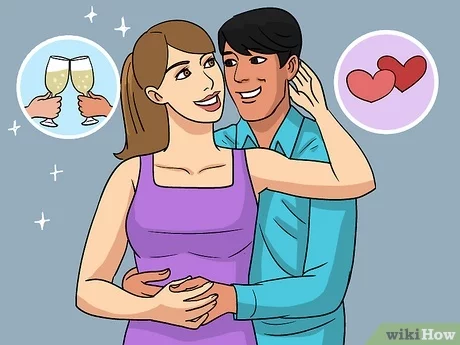In love can be a very intense experience for anyone at any age. Adolescence is when everything seems more significant, and everything is happening for the first time, so the ups, downs, and emotions can feel even more intense. The experience of teenage love is best described by the old song “A Teenager In Love.”
Young love can feel like a rollercoaster between the flood of teenage hormones and the other physical and psychological changes that come with puberty. It is thrilling, frightening, and filled with heart-warming highs and stomach-dropping lows.
Teenage relationships are often viewed from the sidelines by parents. Parents can play an active role in supporting their children as they navigate adolescent love. They need to be able to tell teens what they can expect of a teenager in love and how to give dating advice without invading their privacy.
What are Teenagers Like When in Love?
Teens exhibit many of the same behaviors in the first relationship. It’s just as common as everything else that accompanies teenage love. These are signs that a teenager is in a romantic relationship.
Daydreaming and acting distracted all the time
Anxiety and irritability are two of the most common signs that you are anxious.
Every chance you get, bring a specific person’s name into the conversation
Appetite changes; eating less often than usual
Staying up all night
Spending more time on your appearance
Texting and talking on the phone in their bedroom while they are away
Extreme mood swings
These behaviors make teens more self-conscious and more aware of their feelings. Parents should be attentive and use any chance to speak with their teenagers. If your teen seems distressed, you can gently point out the signs and ask them for their feelings.
The Stages of Teenage Dating
Although every relationship is unique, teenage dating has some standard stages. These six stages are typical in adolescent relationships.
Crushing
The first stage of teenage romance is about admiring each other from afar. The other person may be thinking about them or even attracted to them. They may not even speak to one another. The behaviors described above (“How Teenagers Act when They’re in Love”) are still valid. Even during this phase, the behaviors listed above (“How Teenagers Act When They’re in Love”) still apply. This phase of teenage love is characterized by daydreaming, mood swings, and talking about your crush with all your friends.
Connecting
In phase two, teens move from being attracted to one another to talking and connecting. This stage is called the flirting stage. Teens in love find small ways to show their affection for each other. These interactions can occur at school, in friendship groups after school, or online via texting or social media.
Teens may feel anxious about rejection and hesitate to declare their interest in a person. Teens may become nervous, distracted, and jumpy during this phase. Teens may spend hours pondering over a lunch conversation. They might spend the night texting friends to try and figure out what the comment was that another person posted on social media.
Making the Leap
This is where the teenage relationship begins. They finally find a way to communicate their desire to be together in a romantic relationship. They start dating or hanging out in their respective social circles. Teens can experience euphoria or excitement, manifesting in irregular sleep, decreased appetite, and mood swings.
You should note that teens may have more than one person in their relationship. While it’s difficult to find stats for teens, recent research shows that 1 in 9 single adults in the United States has engaged in polyamorous relationships that include more than two people. High school relationships are more likely to be two-person, even though one or both may have other partners or flirtations.
Getting into a Relationship
This is sometimes called the “mid-term phase,” often the most extended period of a teen relationship. As the partners get more comfortable, they spend more time together and can rely on each other. The couple may explore or engage in sexual activity to strengthen their feelings of teenage love.
Parents can expect their teens to be more secure and relaxed during this relationship. The settling-in period can be fraught with mini-crises and resolutions.
Is this true love? It’s difficult to say. Young people can struggle to distinguish between true love and sexual attraction due to the flood of hormones they experience as teens. It can be difficult for anyone to recognize and define love at any age. It’s natural if it feels authentic to the teen–even if it’s fleeting.
Getting restless
One or both of the teenage partners may feel trapped or irritated. They might feel an attraction toward other people. The relationship might be more severe than it is. Teens often have different maturity levels and are sometimes on different pages regarding how fast the relationship should progress.
Cracks can form in a relationship, regardless of how it is. Parents may notice teens becoming more upset, anxious, and sad as the end of a romantic relationship approaches.
Divorce
This is often the most challenging stage of teenage dating. It can happen slowly or abruptly. The breakup could be mutual or one-sided. It could be in person, over the phone, or via text. According to a Pew Research Centre study, almost a third of teens have broken up with someone via text, even though they agree it isn’t the best.
Teens may display some or all these behaviors after a breakup.
To lick their wounds
Keeping in bed all-day
Crying all of the time
Aggression and anger
Suicidal and self-harm
Parents have a role at this stage. They must offer support and unconditional love. It will be easier for you to communicate with your teenager if you have kept the lines open in the previous stages of teenage love. Parents must ensure that the emotional distress caused by the breakup does not escalate into a mental illness. Additional support may be required for teens who have a mental disorder.
What is the average length of a relationship between teens?
Answering that question can take a few days to the rest of their lives. Some high school couples get married after graduation, but it is only sometimes that long. However, the majority of puppy love does not last. Statistics and facts about teenage relationships show that less than 2 % of people wed their high school sweethearts. Only half of the teens who get married make it to the 10-year mark.
There is so much happening in the teen years and early adult years. It is rare for someone to fall in love with another person as a teenager or adult. Teens often need to be more emotionally mature and have the communication skills to get through all the bumps to a lasting relationship.
Very few high school teens have ever been in a relationship or dated. Pew Research Center data on teens’ relationships shows that only a third of those ages 13-17 have been in a relationship with someone. A mere 1 in 5 teens says they are in a romantic relationship.
How teenage love impacts the brain and mental health
The prefrontal cortex, which is still developing, is the teen brain. This is the part of the brain responsible for reasoning and emotional regulation. Teens can find it difficult to see the big picture or step back to think calmly. A teenager who is in love can feel emotionally unstable and vulnerable. A lack of executive functioning can lead to dangerous behaviors in relationships. When their instincts and physical reactions are overwhelming their rational judgment, teens find it difficult or impossible to plan for the future.
Teen hormones significantly affect teenage behavior, especially during the first love. Both the male hormone testosterone (and the female hormone estrogen) increase in puberty and cause increased sexual desire. Falling in love can also release the hormones serotonin and dopamine. These neurochemicals can cause or increase mood swings, negative emotions and confusion, obsessive thoughts, overwhelm, and other symptoms.
This helps to explain why teens can become manic when they are in love. Researchers found similar hypomania-like effects in teenage love during the first stages of a study published Journal of Adolescent Mental Health. Hypomania, a condition that causes abnormally high levels of energy, activity, and mood changes, is also known as bipolar disorder. Compared to the control group, teens who had never been in a relationship with a teenager were likelier to experience volatile or labile emotions, such as a rapid transition from euphoria and despair.
Additionally, it has been proven that teen love can cause anxiety. Research also shows that teenage love increases the probability of developing depressive symptoms.
“Both the dissolution and involvement in romantic relationships can increase youths’ vulnerability for depressive symptoms because of the novelty and difficulty youth experience managing these emotional events.”
Journal of Clinical Child & Adolescent Psychological
What Teenage Love Can Teach Adolescents
Teenage love is part and parcel of growing up. It’s part of the process of forming your identity, gender identity, and sexual orientation. Erik Erikson, a well-known child development psychologist, described teenage love as a form of self-development. It is not true love or intimacy. Although romantic relationships can be complex in adolescence, finding your way through them and enjoying various mental health benefits is possible.
Teens can learn communication skills, compromise, empathy, and build their values in a romantic relationship. These skills and self-knowledge can be highly beneficial in creating healthy relationships for teens as they enter adulthood. Positive experiences of teenage love support a young person’s self-image, confidence, and ability to form intimate relationships. As they gain autonomy, this can help them to be independent of their parents.
Ten Tips to Help a Teenager Find Love
It’s easier to navigate teenage love than at any other stage of adolescent life with the help and compassion of parents. Here are ten ways to give dating advice to teens and help them navigate the stormy waters of teenage relationships.
Let them know that you are available to talk about anything
There should not be any off-limits topics. Listen carefully and don’t judge or show a strong reaction to anything, even if you are surprised or concerned. Do your research if your teen asks you questions that are uncomfortable or don’t have the answers. You can also request a friend, family member, or healthcare professional for help. When giving teens dating advice, offering support and not just laying down rules is essential. One study found that lectured teens increase the probability of having sexual intercourse.
Celebrate and validate their experience
The first time you fall in love with your teenage lover is an incredible, powerful, and memorable experience. Parents can easily focus on protecting and worrying about their teens instead of celebrating the things they are going through. This is an important rite; your teen will enjoy it more if you are supportive and positive.
Please encourage them to end their relationship
Social media can make minor problems larger and twist interactions. Texting can get misinterpreted and become unnecessarily complex if it isn’t accompanied by body language and facial expressions (emojis aren’t worth the effort). Teens should unplug and engage in IRL activities. This could be hiking with friends, going to the beach, or old-fashioned dates such as dinner and a movie. This is where you can make the most of your friendships.













